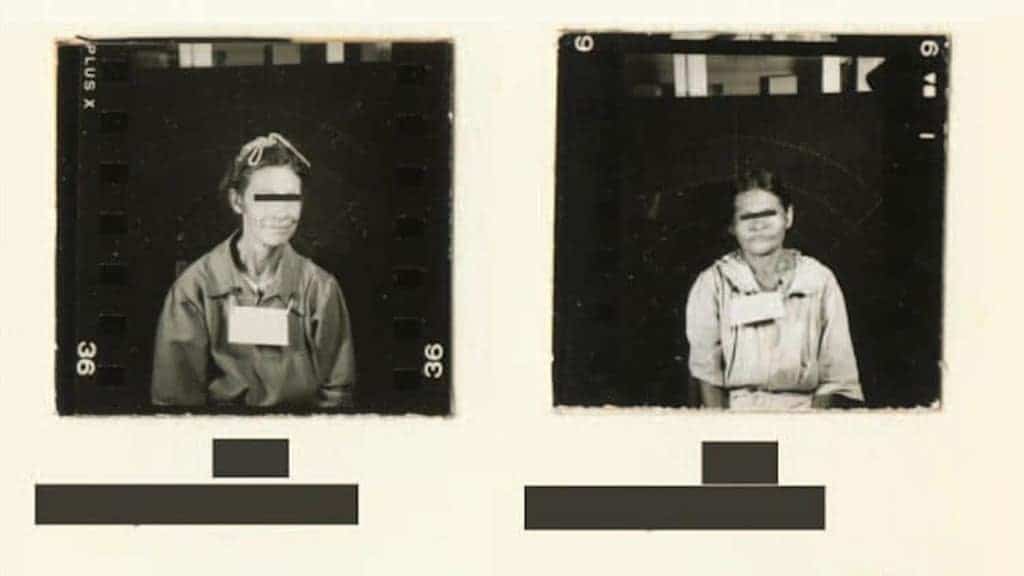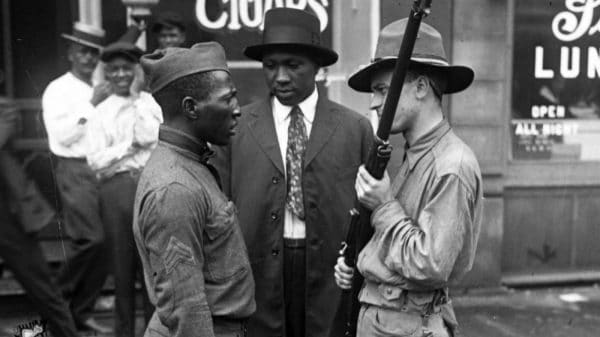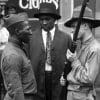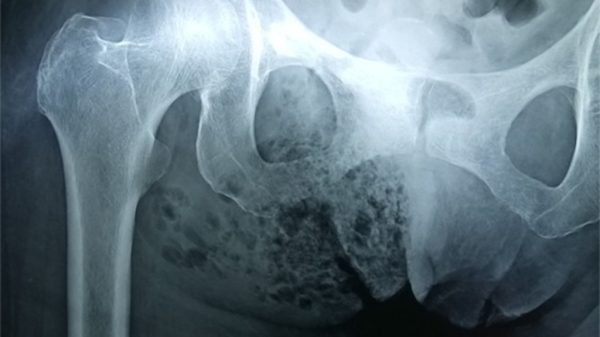Anyone who says the government has our best interests at heart has not read history. There is a long and sordid history of medical experimentation, often with the involvement of the U.S. Military, the medical establishment, chemical corporations, and the pharmaceutical industry, that many people know the “greatest hits” of—the Manhattan Project, MK Ultra—but there are way too many instances of deadly and damaging human experimentation in our history.
Today I want to share 11 examples of American medical experimentation on its citizens (and on other countries’ citizens) that are stomach-churning, to say the least…
Deadly Cancer Research on Puerto Rican Patients
In 1931, Dr. Cornelius Rhoads infected human subjects with cancer cells while working with the Rockefeller Institute for Medical Investigations in Puerto Rico, under the auspices of studying hookworm-caused anemia and tropical sprue anemia.
Dr. Cornelius Rhoads wrote an infamous letter on November 10, 1931, which stated the following:
Porto Ricans are the dirtiest, laziest, most degenerate and thievish race of men ever to inhabit this sphere…They are even lower than the Italians. What the island needs is not public health work, but a tidal wave or something to totally exterminate the entire population…I have done my best to further the process of their extermination by killing off eight and transplanting cancer into several more. All physicians take delight in the abuse and torture of the unfortunate subjects.
– Dr. Cornelius P Rhoads for the Rockefeller Institute for Medical Research
Rhoads won the Legion of Merit in 1945.
From 1945 to 1953, Rhoads also served as the first director of the Sloan-Kettering Institute, where he conducted Department of Defense radiation exposure experiments on American soldiers and civilian hospital patients in a study called “Post-Irradiation Syndrome in Humans.”
In 1979, the American Association for Cancer Research established the Cornelius P. Rhoads Memorial Award for “meritorious achievement in cancer research.” For years, the AACR was fielding complaints about Rhoads’ racist letter and the award being given in his name, which apparently they didn’t find too offensive, until finally in 2003 they decided to rename the award.
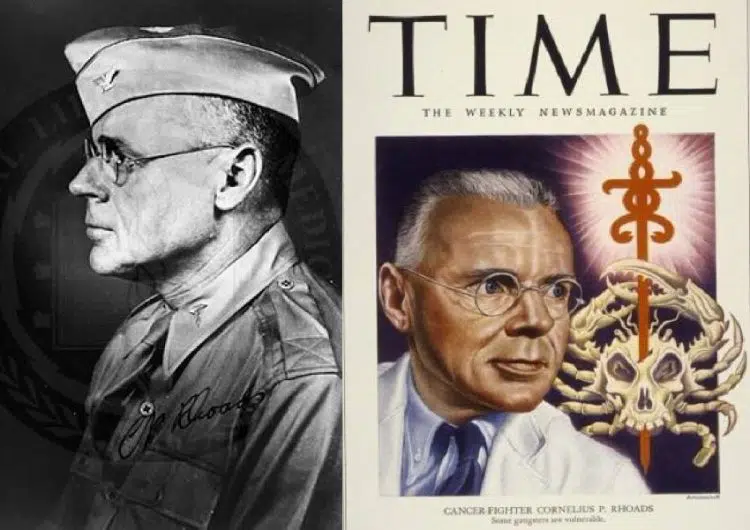
The Guatemala Syphilis Study
Fourteen years after the Tuskegee Syphilis Study started, the U.S. also conducted syphilis experiments in Guatemala, purposely infecting Guatemalan men and women on their genitals, arms, and faces with syphilis bacteria. American researchers infected a total of 1,308 people with STDs, including gonorrhea and chancroid. While they did offer penicillin as a treatment (so that’s how they figured it out, huh), it’s estimated more than 30% of the patients they infected were left untreated. In 2010, the US government apologized, apparently “outraged” that such a thing could have happened (again).
The sexually transmitted disease inoculation study conducted from 1946-1948 in Guatemala was clearly unethical. Although these events occurred more than 64 years ago, we are outraged that such reprehensible research could have occurred under the guise of public health. We deeply regret that it happened, and we apologize to all the individuals who were affected by such abhorrent research practices.
2010 joint statement from Secretary of State Hillary Clinton and Health and Human Services Secretary Kathleen Sebelius
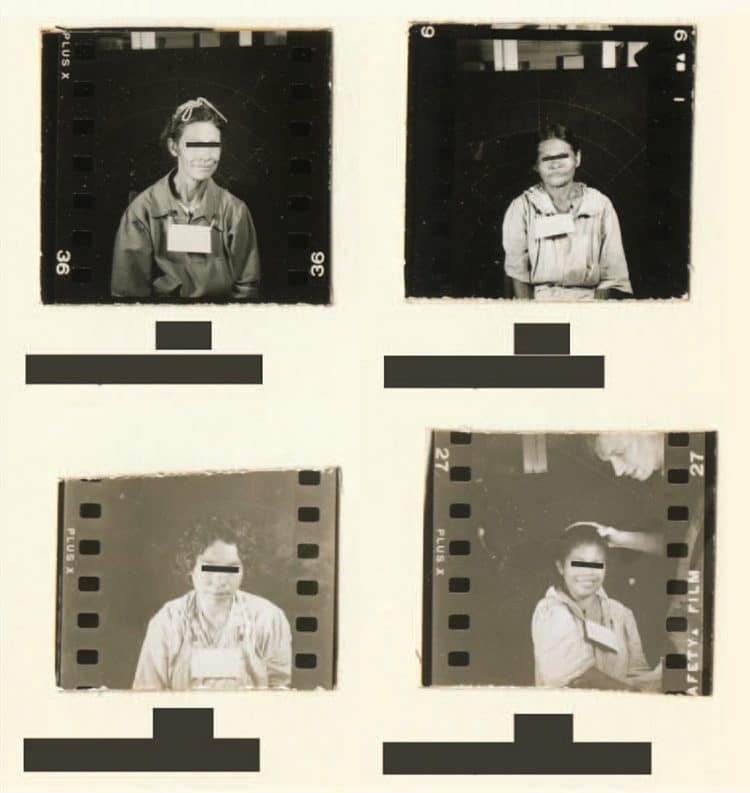
The Stateville Penitentiary Malaria Experiments
In 1940, 400 Chicago prisoners were infected with malaria to study the effects of new and experimental drugs. The researches used early release as an incentive to involve the prisoners in the study, even having the prisoners run the study, deciding who should be eligible, infecting one another, and administering drugs to each other.
In a military-sponsored research project begun during the Second World War, inmates of the Stateville Penitentiary in Illinois were infected with malaria and treated with experimental drugs that sometimes had vicious side effects. They were made into reservoirs for the disease and they provided a food supply for the mosquito cultures.
Nathaniel Comfort, “The prisoner as model organism: malaria research at Stateville Penitentiary”; Stud Hist Philos Biol Biomed Sci. 2009 Sep; 40(3): 190–203.
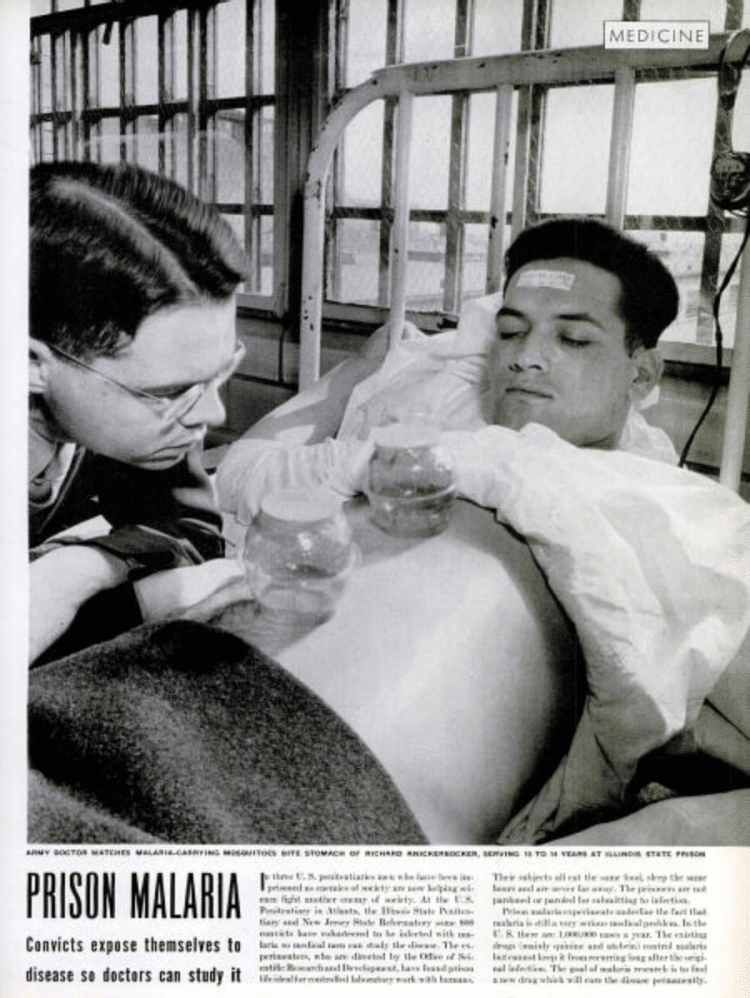
Germ Warfare Testing in San Francisco
You know the pink stuff that starts to appear in your shower grout when you haven’t been on your 1950s housewife game for a while? It’s called Serratia marcescens, and it’s been found to cause infections like pneumonia, lower respiratory tract infection, urinary tract infection, bloodstream infection, wound infection, and meningitis.
For six days in 1950, the U.S. Navy sprayed a fog of the bacteria a couple of miles off the coast of the city of San Francisco in a germ warfare simulation called Operation Sea-Spray. The bacterial “fog” blended in with San Francisco’s usual grey blanket and coated its residents, extending into Albany, Berkeley, Daly City, Colma, Oakland, San Leandro, and Sausalito. The bacteria spray caused several cases of severe urinary tract infections requiring hospitalization, leading to at least one death. By UTI. That’s horrific.
Serratia marcescens is so rarely a cause of illness, and the illness resulting is predominantly so trivial, that its use as a simulant should be continued, even over populated areas.
Investigation findings under General William Creasy, commander at Fort Derek, Frederick, MD

M.I.T. Radiation Experiments on Disabled Children
During the Cold War, MIT researchers and the Quaker Oats Company collaborated to feed the mentally disabled children at the Walter E. Fernald School in Waltham, MA, doses of radiation in their cereal. The kids and their parents were told they were in a “science club,” and while the parents had to sign waivers for their sons to be involved, the researchers left out the fact that they were feeding their kids radioactive materials.
The researchers fed children doses of radiation with their breakfast cereal for the purpose of studying the way the body absorbs calcium and iron. The experiments were often performed without the informed consent of the subjects or their families.
Stacey E. Blau, Institute Charged in Fernald Radiation Experiment Lawsuit, 1995
…
But because there was no evidence that the subjects were harmed by exposure to any dangerous levels of radiation, the government is not obliged to monetarily compensate them.
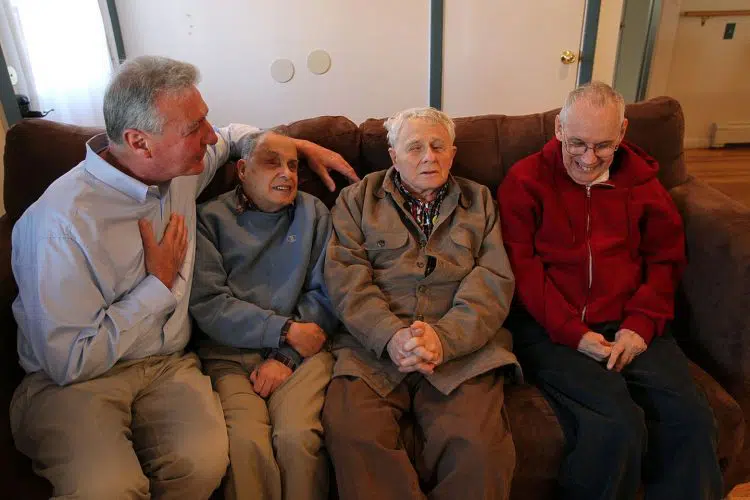
Race-specific Germ Warfare Testing
In 1951, the African-American employees at the Norfolk Naval Supply Center in Newport News, VA, were exposed to a race-specific fungal weapons test. The military wanted to study the effects of the fungus Aspergillus fumigatus on their Black employees, claiming it was because one of America’s enemies might decide to specifically target Black Americans. But it’s only ever been the White Supremacist American Establishment that’s specifically targeted Black Americans. The researchers packed crates with Aspergillus fumigatus spores to watch the effects on the people who were unpacking them. The fungus is known to cause lethal infections, necrosis, and inflammation of the tissues, and can be deadly for immunocompromised people.
Since Negroes are more susceptible to coccidioides than are whites, this fungus disease was simulated by using Aspergillus fumigatus.
Report on the testing at the Norfolk Naval Supply Center

Dioxin Experiments at Homesburg State Prison
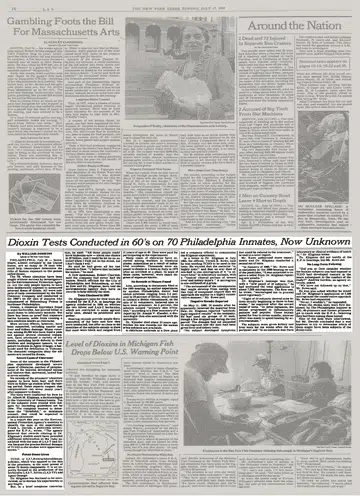
In 1965, as many as 70 prisoners at Homesburg State Prison in Philadelphia were subjected to a dioxin herbicide known as TCDD, or 2,3,7,8-tetrachlorodibenzo-p-dioxin to study its carcinogenic effects. TCDD is the most potent dioxin compound and is formed in the production of Agent Orange.
The study was commissioned by the Dow Chemical Company, and the prisoners were volunteers—the researchers again chose mostly African-American men between the ages of 21 and 49 and paid them for their involvement in the study.
It was run by Dr. Albert M. Kligman on behalf of Dow, and the volunteers were given different dosages of the chemicals to measure the results, with 10 of them receiving doses that were far more than Dow had given guidelines for. It was suspected that dioxin exposure had the potential to cause cancer and liver and kidney damage, however, the researchers neglected to follow up with the volunteers to see if any of them had developed cancers later on. The records were conveniently lost. Homesburg closed in 1995.
All those people could have leukemia now – about one chance in 20 billion. And I could be hit by an asteroid when I walk out on the street, but I don’t think I will.
Dr. Albert M. Kligman

Germ Warfare Experiments in the NYC Subway
In 1966, the New York subway system was used for a germ warfare experiment.
The field test was called “A Study of the Vulnerability of Subway Passengers in New York City to Covert Attack with Biological Agents” and involved six days of exposing subway commuters to Bacillus globigii (the bacteria that commonly causes food poisoning) and S. marcescens.
In a 1995 Newsday story, reporter Dennis Duggan contacted retired Army scientist Charles Senseney, who had testified about the experiments to a Senate subcommittee in 1975. In his testimony, he explained that one light bulb full of bacteria dropped at 14th Street easily spread the bacteria up to at least 58th Street.
– Kevin Loria; “Over and over again, the military has conducted dangerous biowarfare experiments on Americans”; Business Insider, 2016

“Ethnic Weapons”
In 1970, the Military Review reported that “ethnic weapons” development was intensified to be able to target specific ethnic groups thought susceptible to genetic differences and DNA variations.
Recently, a series of widely debated observations have revealed an enzyme deficiency in southeastern Asian populations, making them susceptible to a poison to which Caucasoids are largely adapted. In such situations, the sketchy grid just mentioned is of some use. One looks for the posibility of the poison-provoking enzyme production, an individual adaptation observed in several instances.
– excerpt from “Ethnic Weapons” by Carl Larsen, Military Review, 1970
…
Psychochemicals would make it possible to paralyze temporarily entire population centers without damage to homes and other structures. In addition, with the small quantities required for full effect of modern incapacitating agents, logistics problems would be minute. The effective dose of BZ-type agents amounts to micrograms.
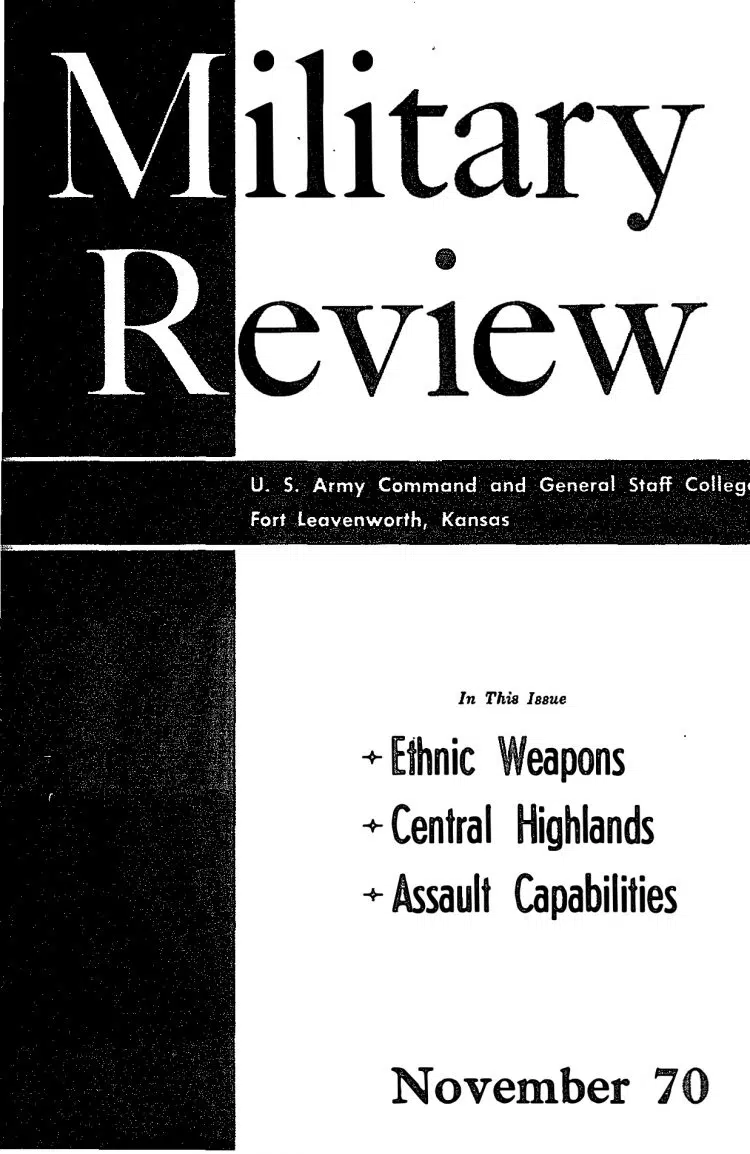
The National Influenza Immunization Program
In 1976, a mass vaccination campaign set out to convince Americans to vaccinate against a strain of H1N1 or Swine Flu that had broken out at Fort Dix, NJ. About 200 recruits got sick with the influenza strain, and the Advisory Committee on Immunization Practices (ACIP) of the United States Public Health Service were worried about a pandemic. Citing the 1918 Swine Flu pandemic, President Ford initiated the National Influenza Immunization Program (NIIP).
Pharmaceutical companies Merrell and Merck & Co. agreed to manufacture test vaccines in exchange for guaranteed profit and the government taking on liability for any side effects or injury. In pharma-speak that means “for the public good.”
When the vaccine rollout began, it quickly became clear that there were disastrous side effects in some cases. Although around 45 million Americans were vaccinated, 362 people were diagnosed with Guillain-Barré Syndrome after receiving the vaccine, just a few weeks after the vaccination campaign began in late September 1976. GBS causes an autoimmune response attacking the entire nervous system, resulting in muscle weakness that inhibits breathing, and results in paralysis in some cases. It was estimated that the vaccine increased people’s chances of developing GBS four-fold, and the campaign was shut down.
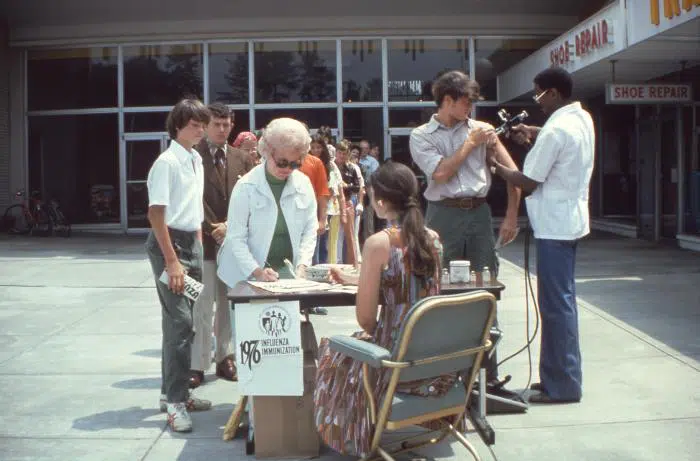
Experimental Vaccines on Black and Hispanic Babies

In 1990, the U.S. government authorized a year-long study of two unlicensed and experimental measles vaccines for Los Angeles infants, co-sponsored by Kaiser Permanente of California. The vaccines were authorized for use in Africa and Haiti, and after a year of use had resulted in an increased death rate among female babies.
So in Los Angeles, they chose to give the unlicensed vaccines, Edmonston-Zagreb and Moraten, to 1,500 Black and Hispanic babies in East L.A., West L.A., and Inglewood. The CDC claims there was “no ill intent” behind the study, but the parents were not informed that their babies were a part of an experiment, only that their children were receiving routine measles vaccinations. And only Black and Hispanic babies were chosen to get the experimental vaccines. This fact, along with the testing in Africa and Haiti, seems consistent with the systemic ill intent known as “medical racism.” There was one 22-month-old boy who died of a bacterial infection after getting a low-dose experimental E-Z vaccine, but the CDC decided was unrelated to his participation in the experiment.
A mistake was made.
Dr. David Satcher, Director of the CDC in 1996
Our doctors just didn’t think of it as being “experimental.”
Barbara Reynolds, Senior Advisor Crisis and Risk Communication at the CDC in 1996
Gulf War Syndrome
In 1990 and 1991, before deploying to the Persian Gulf, all US troops and merchant marines were inoculated with experimental anthrax and botulinum toxoid vaccines, even though concerns were raised about their adverse long-term effects. Over 12,000 died and over 30% became ill from non-combat-related factors in what subsequently was called Gulf War Syndrome, the result of exposure to a variety of toxins. Gulf War Syndrome covers everything from chronic fatigue syndrome, fibromyalgia, functional gastrointestinal disorders, and other illnesses. It’s been linked to squalene, a chemical added to the anthrax vaccine to increase its potency.
This story hits close to home for us — my mother-in-law was a merchant marine in the 1990s, and received the experimental anthrax vaccine before traveling to the Gulf, causing permanent damage to her heart resulting in arrhythmia. She told us about her experience the other day, saying that she and her crew were given the “option” to be vaccinated once onboard their ship and in the Gulf. Anyone who opted out of vaccination would have to go home at a cost of about $5000, more than their contact had paid thus far. “Not really a choice,” she told us. When she developed heart problems after getting the vaccine, she had to fight to get a settlement to cover her medical costs and told us that many of her colleagues who suffered side effects didn’t get any compensation from the military. She’s still dealing with her vaccine-related heart problems at age 79.
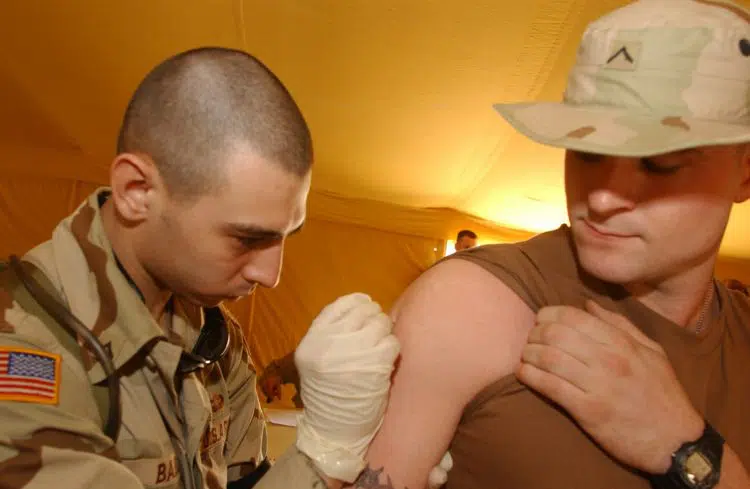
There are so many more examples that I didn’t have time to include in this article, so feel free to drop more human experimentation knowledge in the comments!

